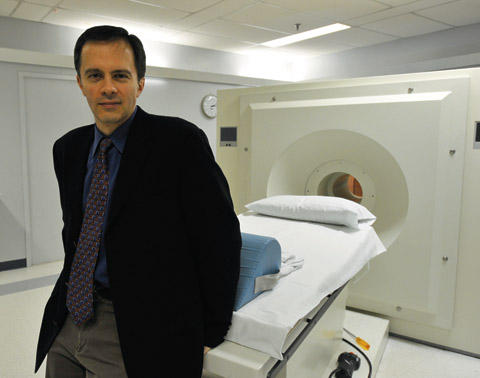 A new study by the Centre for Addiction and Mental Health (CAMH) found that the measure of brain inflammation in people who were experiencing clinical depression was increased by 30 percent. The findings, published today in JAMA Psychiatry, have important implications for developing new treatments for depression.
A new study by the Centre for Addiction and Mental Health (CAMH) found that the measure of brain inflammation in people who were experiencing clinical depression was increased by 30 percent. The findings, published today in JAMA Psychiatry, have important implications for developing new treatments for depression.“This finding provides the most compelling evidence to date of brain inflammation during a major depressive episode,” says senior author Dr. Jeffrey Meyer of CAMH’s Campbell Family Mental Health Research Institute. “Previous studies have looked at markers of inflammation in blood, but this is the first definitive evidence found in the brain.”
Specifically, Dr. Meyer’s research team was able to measure the activation of immune cells, known as microglia, that play a key role in the brain’s inflammatory response.
To investigate whether brain inflammation was increased in people during clinical depression, Dr. Meyer and his team conducted brain scans on 20 patients with depression but who were otherwise healthy and 20 healthy control participants using a brain imaging technique called positron emission tomography (PET). Results showed a significant elevation of brain inflammation in participants with depression. Rates of inflammation were also highest among those with the most severe depression.
Although the process of inflammation is one way that the brain protects itself — similar to the inflammation of a sprained ankle — too much inflammation may not be helpful and can be damaging. A growing body of evidence suggests the role of inflammation in generating the symptoms of a major depressive episode such as low mood, loss of appetite, and inability to sleep. But what was previously unclear was whether inflammation played a role in clinical depression independent of any other physical illness.
“This discovery has important implications for developing new treatments for a significant group of people who suffer from depression,” says Dr. Meyer, who also holds a Canada Research Chair in the neurochemistry of major depression. “It provides a potential new target to either reverse the brain inflammation or shift to a more positive repair role, with the idea that it would alleviate symptoms.”
The drive to uncover new ways to target and treat depression is fueled by the reality that more than half of people with major depression do not respond to antidepressant treatments and four per cent of the general population is the midst of a clinical episode. Current treatments do not target inflammation, and treating depression with anti-inflammatories is one avenue for future research, Dr. Meyer says.
“Depression is a complex illness and we know that it takes more than one biological change to tip someone into an episode,” says Dr. Meyer. “But we now believe that inflammation in the brain is one of these changes and that’s an important step forward.”
First author of the study was post-doctoral research fellow Dr. Elaine Setiawan. This research was supported by the Canadian Institutes of Health Research, the Brain and Behavior Research Foundation, the Canada Foundation for Innovation and the Ministry of Research and Innovation.
Filed Under: Drug Discovery




